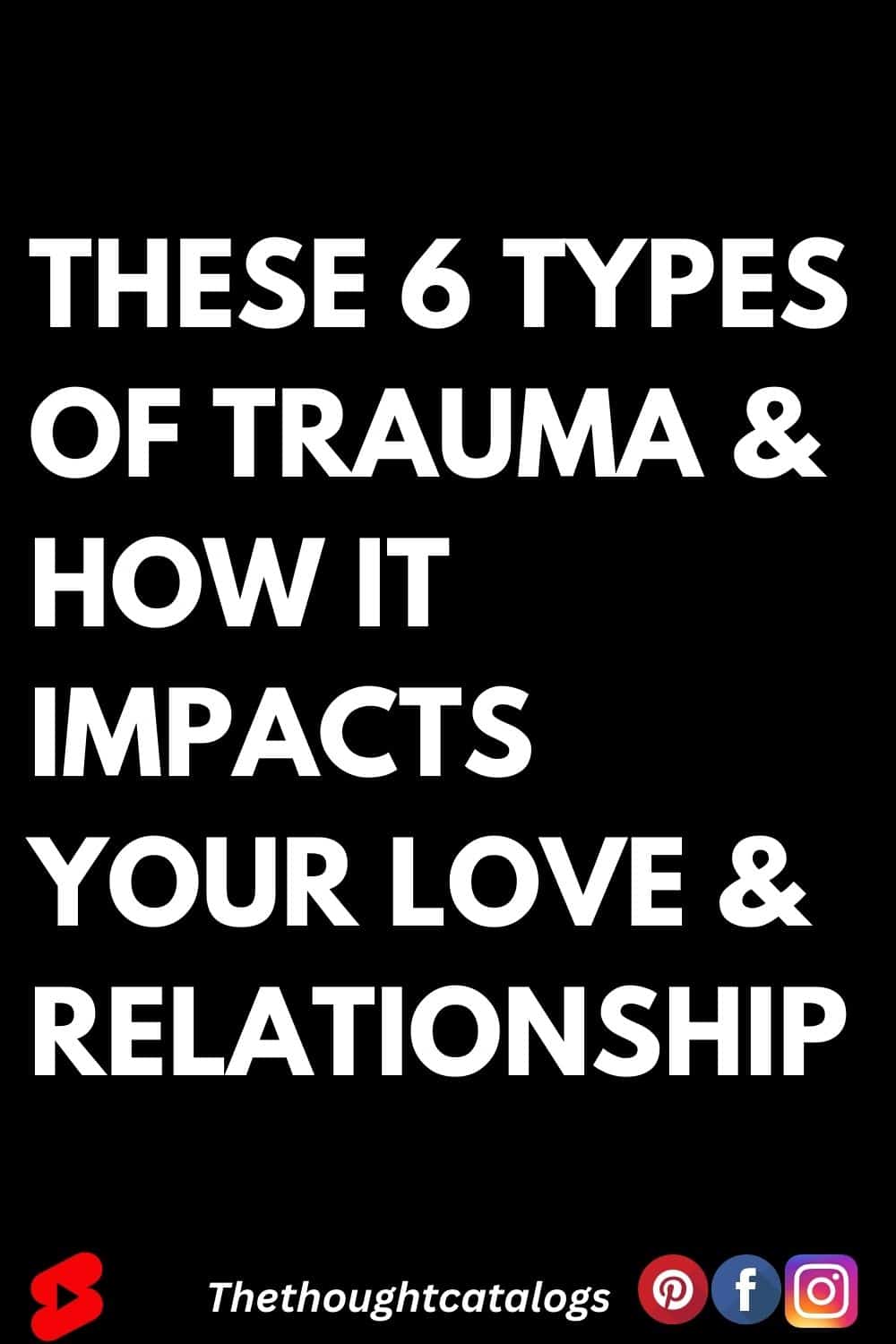
Trauma can have a significant impact on your life, particularly on your relationships. Trauma can manifest in various ways, and it can be challenging to understand how it affects you and your partner. In this article, we will explore six types of trauma and how they can impact your love and relationship.
Understanding Trauma and Its Impact on Relationships
Trauma is an event or series of events that can have a lasting impact on a person’s life. Trauma can manifest in different ways and can be triggered by various situations, including abuse, violence, accidents, and disasters. Trauma can affect a person’s mental, emotional, and physical health, and it can also impact their relationships.
Trauma can make it difficult for individuals to trust others, express their emotions, and form healthy attachments with others. This can make it challenging to form and maintain a healthy relationship with a partner.
Types of Trauma and Their Impact on Relationships
There are different types of trauma, and each can have a unique impact on a person’s life and relationships. Here are six types of trauma and how they can affect your relationship:
Childhood Trauma
Childhood trauma can have a lasting impact on a person’s life, particularly on their relationships. Childhood trauma can include physical, emotional, or sexual abuse, neglect, or witnessing violence or abuse. Childhood trauma can affect a person’s ability to trust others, form attachments, and communicate effectively.
Sexual Trauma
Sexual trauma can affect a person’s ability to form healthy relationships and trust others. Sexual trauma can cause feelings of shame, guilt, and fear, making it challenging to engage in intimate relationships with others.
Physical Trauma
Physical trauma can result from accidents, injuries, or abuse. Physical trauma can cause chronic pain, disability, and psychological distress, affecting a person’s relationships with others.
Emotional Trauma
Emotional trauma can occur as a result of experiencing or witnessing a traumatic event, such as a natural disaster or an act of violence. Emotional trauma can lead to feelings of anxiety, depression, and emotional instability, affecting a person’s relationships with others.
Financial Trauma
Financial trauma can occur as a result of significant financial losses, such as bankruptcy or job loss. Financial trauma can cause stress, anxiety, and depression, affecting a person’s relationships with others.
Psychological Trauma
Psychological trauma can occur as a result of experiencing or witnessing a traumatic event, such as abuse or violence. Psychological trauma can lead to post-traumatic stress disorder (PTSD), anxiety, and depression, affecting a person’s relationships with others.
Identifying Trauma in Your Relationship
Identifying trauma in your relationship can be challenging, particularly if you or your partner have not acknowledged the trauma. Some signs that trauma may be affecting your relationship include:
- Difficulty communicating
- Avoiding intimacy or physical touch
- Lack of trust or jealousy
- Frequent arguments or conflicts
- Emotional withdrawal or shutting down
How to Overcome Trauma in Your Relationship
If you or your partner have experienced trauma, it’s essential to seek help to address the underlying issues and overcome the impact it has on your relationship. Here are some strategies that can help you overcome trauma in your relationship:
Seek Professional Help
Trauma can be challenging to overcome without the help of a professional. A therapist can help you and your partner address the underlying issues and develop strategies to manage the impact of trauma on your relationship.
Communicate Effectively
Communication is crucial in any relationship, but it’s even more critical when dealing with trauma. Effective communication can help you and your partner express your feelings, needs, and boundaries. It’s essential to be patient and compassionate when communicating with your partner, particularly when discussing sensitive issues related to trauma.
Practice Self-Care
Trauma can be emotionally and physically draining, making it essential to practice self-care regularly. Self-care can include engaging in physical activity, spending time with loved ones, and participating in activities that bring you joy and relaxation.
Be Patient
Overcoming trauma takes time and patience. It’s important to be patient with yourself and your partner and to acknowledge that healing is a process that may take time.
Maintaining a Healthy Relationship After Trauma
Maintaining a healthy relationship after trauma requires ongoing effort and communication. Here are some strategies that can help you maintain a healthy relationship after trauma:
- Practice open communication and honesty with your partner
- Develop and maintain healthy boundaries
- Support each other’s emotional needs
- Participate in activities that bring you joy and connection
- Seek professional help if needed
Conclusion
Trauma can have a significant impact on your life and relationships. It’s essential to understand the different types of trauma and how they can affect your relationship. If you or your partner have experienced trauma, seeking professional help, effective communication, practicing self-care, and being patient can help you overcome the impact of trauma on your relationship and maintain a healthy, fulfilling relationship.
FAQs
- Can trauma affect your ability to trust others? Yes, trauma can make it difficult to trust others and form healthy attachments with others.
- How can you identify trauma in your relationship? Signs of trauma in a relationship can include difficulty communicating, avoiding intimacy or physical touch, lack of trust or jealousy, frequent arguments or conflicts, and emotional withdrawal or shutting down.
- Can trauma impact physical health? Yes, trauma can impact physical health and can result in chronic pain, disability, and other health issues.
- How can you maintain a healthy relationship after trauma? Maintaining a healthy relationship after trauma requires ongoing effort, effective communication, healthy boundaries, emotional support, and self-care.
- Can trauma be overcome? Yes, trauma can be overcome with the help of professional, effective communication, self-care, and patience.





